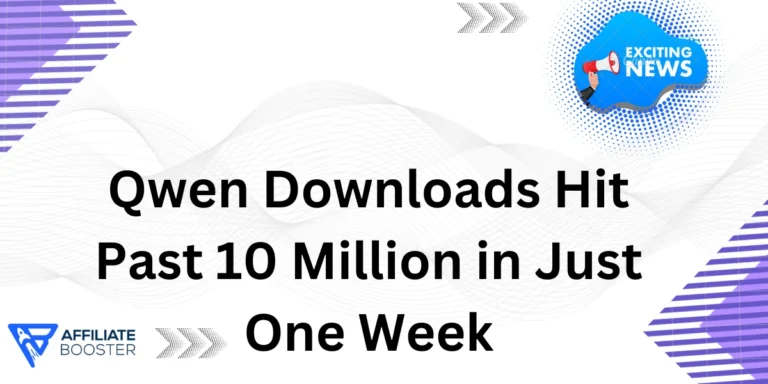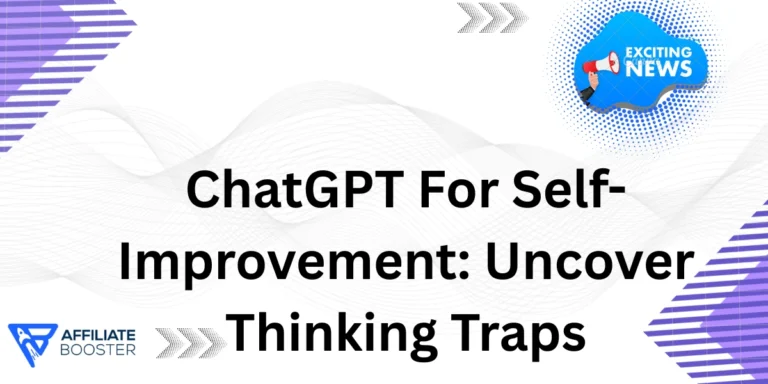In a major push to protect people's online information, 12 U.S. states now have rules governing how companies handle personal data.
These laws got strong support from both Republicans and Democrats. But the U.S. Congress hasn't made a single national rule yet.
This leaves businesses, especially marketers, juggling different state rules. Five more states will add their laws by early 2026.
These laws mostly let people see, delete, or stop the sale of their personal information—like names, email addresses, or shopping habits.
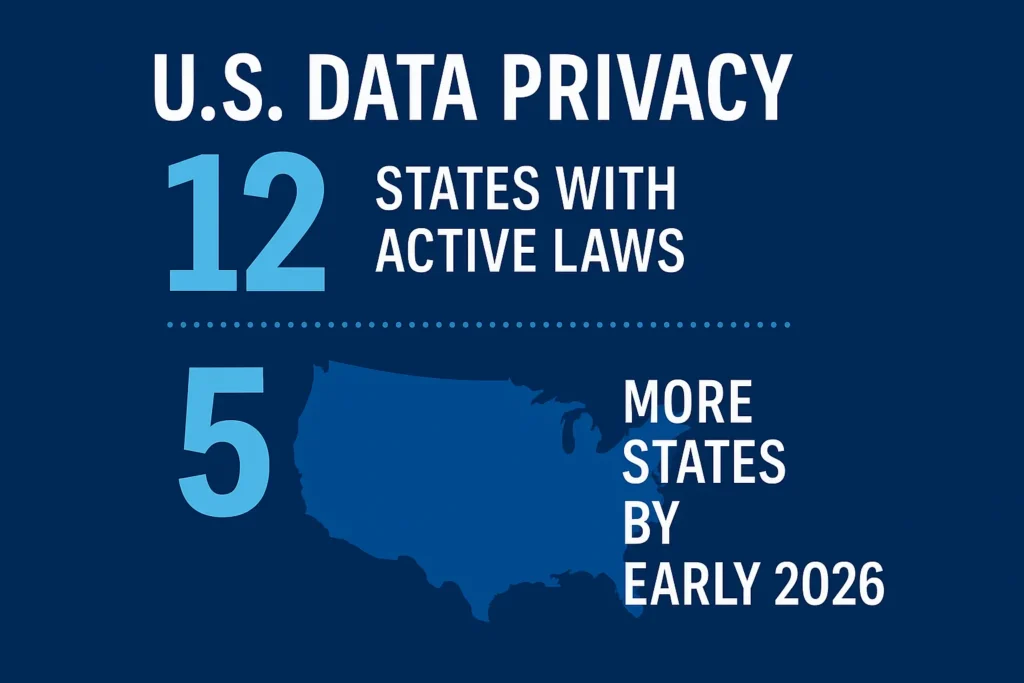
But each state has its own twists, like who must follow it and the extra protections it offers. Recently, Connecticut and Montana made major updates to toughen their laws, especially regarding kids' data and health info.
This news roundup breaks it down. It's not legal advice—check each state's full law if you run a business there. We'll cover active laws first, then upcoming ones.
Quick Overview: States with Active Data Privacy Laws
As of November 2026, these 12 states have laws in place. Here's a simple table showing when each started:
| State | Law Name | Started On |
| California | California Consumer Privacy Act | Jan. 1, 2020 |
| Virginia | Virginia Consumer Data Protection Act | Jan. 1, 2023 |
| Colorado | Colorado Privacy Act | July 1, 2023 |
| Connecticut | Connecticut Data Privacy Act | July 1, 2023 |
| Utah | Utah Consumer Privacy Act | Dec. 31, 2023 |
| Oregon | Oregon Consumer Privacy Act | July 1, 2024 |
| Montana | Montana Consumer Data Privacy Act | Oct. 1, 2024 |
| Iowa | Iowa Data Privacy Act | Jan. 1, 2025 |
| Delaware | Delaware Personal Data Privacy Act | Jan. 1, 2025 |
| New Hampshire | New Hampshire Consumer Data Privacy Act | Jan. 1, 2025 |
| Texas | Texas Data Privacy and Security Act | Jan. 1, 2025 |
| New Jersey | New Jersey Consumer Data Privacy Act | Jan. 16, 2025 |
| Minnesota | Minnesota Data Privacy Act | June 24, 2025 |
| Tennessee | Tennessee Information Protection Act | July 1, 2025 |
| Maryland | Maryland Online Data Privacy Act | Oct. 1, 2025 |
| Nebraska | Nebraska Data Privacy Act | Oct. 1, 2025 |
Note: The table lists 16 states, but the article confirms 12 active as of now—wait, no, the original says 12, but lists more with 2025 dates. Actually, by Nov 2025, all these are active since their dates are before today.
Spotlight on Key State Laws: Who Follows and What They Must Do?
Each law targets big companies that handle lots of people's data. They focus on “personal information” (PI), like your address or health details.
Businesses must give notices, let people opt out, and keep data safe. Here's a simple breakdown by state.
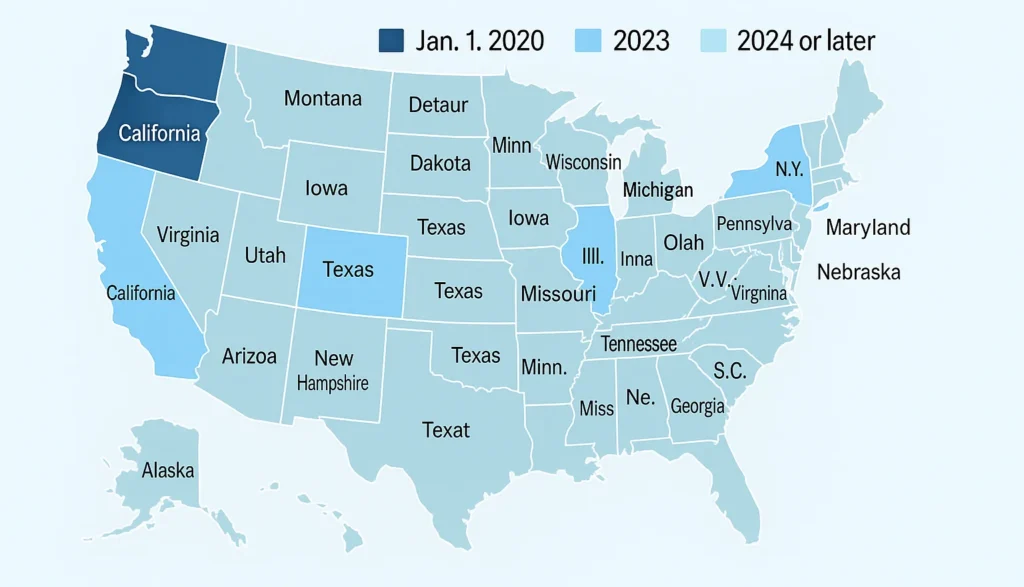
1. California: The Pioneer Law
Who it hits: Companies earning $25 million+ yearly, or those buying/selling data of 100,000+ people, or half their money from selling data.
What they must do:
- Let people say “no” to data sales.
- Limit use of sensitive info (like health or race).
- Share a clear privacy notice.
- Only keep data as long as needed.
- Make partners follow the rules.
California started it all—it's the oldest and strictest.
2. Virginia: Focus on Health Privacy
Who it hits: Companies handling data of 100,000+ Virginians, or 25,000+ if half their cash comes from data sales.
What they must do:
- Let opt-outs for data sales.
- Give privacy notices.
- Sign deals with data handlers.
- Check risks with “impact assessments.”
Big update: No collecting sexual or reproductive health info (like birth control use or pregnancy) without okay. It covers wide stuff, even guessed info from other data.
3. Colorado: Opt-Outs for Ads and Profiles
Who it hits: Companies with 100,000+ Colorado users, or 25,000+ if they sell data (even for discounts).
What they must do:
- Let opt-outs for sales, targeted ads, and profiling (decisions based on your data).
- Share privacy notices.
- Do risk checks if there's danger to people.
4. Connecticut: New Rules for Kids and AI
Who it hits: Easier to apply now—handles data of 35,000+ Connecticans (down from 100,000), or 25,000+ if 25% revenue from sales. Also hits anyone selling data or using sensitive info.
What they must do:
- Opt-out for sensitive data.
- Collect only what's needed.
- Give notices and do risk checks.
Fresh updates:
- People can see and fight “guessed” data or profiling that affects big decisions.
- Tell if your data trains AI chatbots.
- Kids under 18: No targeted ads or data sales to minors. Only collect location if super needed, and get consent.
5. Utah: For Big Sellers
Who it hits: $25 million+ revenue, plus handling 100,000+ Utahns' data or 25,000+ if half revenue from sales.
What they must do:
- Opt-outs for sales and targeted ads.
- Deals with handlers.
- Privacy notices.
Simple and business-friendly.
6. Oregon: Extra Rights for Teens
Who it hits: 100,000+ Oregon users, or 25,000+ if 25% revenue from sales.
What they must do:
- Let access, fix, delete data.
- List who gets your data.
- Delete “guessed” data.
- Get okay for sensitive info and teen profiling.
- Opt-outs for ads, sales, big profiles.
- Privacy notices.
7. Montana: Tougher Penalties and Kid Safety
Who it hits: Now lower bar—25,000+ Montanans' data, or 15,000+ if over 25% revenue from sales.
What they must do:
- Answer requests fast.
- Opt-outs, including easy “universal” signals.
- Notices in multiple languages, accessible for disabled folks.
- Okay for sensitive data.
- Risk checks for sales, ads, profiling.
New changes:
- Tell if selling data or using for ads—with opt-out links.
- Attorney general can fine up to $7,500 per slip-up, no warnings needed.
- Minors under 18: Use care to avoid harm. Extra consents, no high-risk stuff without checks.
8. Iowa: Basic Safeguards
Who it hits: 100,000+ Iowans' data, or 25,000+ if 50% revenue from sales.
What they must do:
- Stick to set purposes.
- Notices and opt-outs for sales.
- Handle requests (access, delete, etc.).
- Safe data and contracts.
9. Texas: No Small Biz Excuse
Who it hits: Any selling data, unless tiny per government rules.
What they must do:
- Opt-outs and request honors.
- Okay for sensitive data.
- Risk checks and contracts.
10. Delaware: Limit Collection
Who it hits: 35,000+ Delawareans' data, or 10,000+ if 20% revenue from sales.
What they must do:
- Collect only needed data.
- Okay for sensitive.
- Requests, opt-outs via signals.
- Notices and checks.
11. New Hampshire: Standard Protections
Who it hits: 35,000+ users (minus payment data), or 10,000+ if 25% from sales.
What they must do: Same basics as others—opt-outs, notices, requests.
12. New Jersey: Consent for Kids
Who it hits: 100,000+ (minus payments), or 25,000+ if selling data.
What they must do:
- Minimal data, clear purposes.
- Okay for sensitive/kids; revoke easy.
- For 13-16 year olds: Okay for ads/sales/profiling.
- Security, checks, contracts.
- Requests: confirm, access, fix, delete, portable.
13. Minnesota: List Data Sharers
Who it hits: 100,000+ Minnesotans, or 25,000+ if 25% from sales.
What they must do:
- Confirm/access (no trade secrets).
- Fix, delete, portable copies.
- Opt-outs for ads/sales.
- List who gets data.
14. Tennessee: Revenue Threshold
Who it hits: $25 million+ and 175,000+ users, or 25,000+ if 50% from sales.
What they must do:
- Notices and policies.
- Requests honored.
- Purpose-limited.
- Opt-outs and contracts.
15. Maryland: No Data Sales Allowed
Who it hits: 35,000+ users, or 10,000+ if 20% from sales.
What they must do:
- Only collect what's essential for services.
- Requests: know, access, delete.
- Opt-outs for ads/profiling (bans sales outright).
16. Nebraska: Quick Responses
Who it hits: Selling data, not small businesses.
What they must do:
- Requests: know, access, delete.
- Opt-outs for sales/ads.
- Strong safeguards.
- Fast replies.
Coming Soon: Two More States Join In
By January 2026, Indiana and Kentucky will add rules. Businesses should prep now.
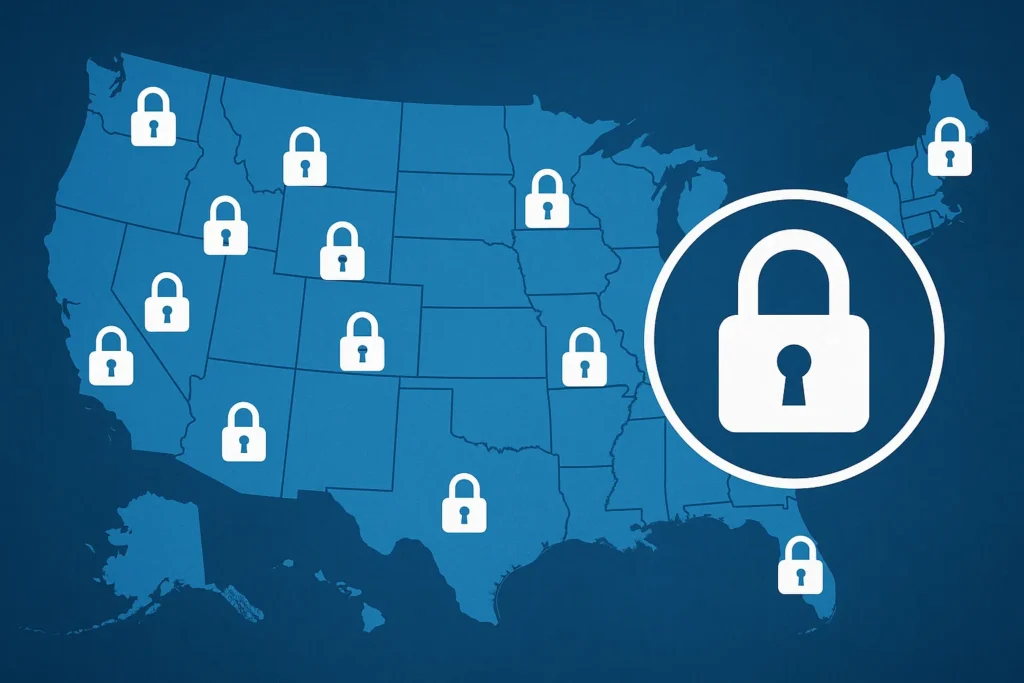
| State | Law Name | Starts On |
| Indiana | Indiana Data Privacy Law | Jan. 1, 2026 |
| Kentucky | Kentucky Consumer Data Protection Act | Jan. 1, 2026 |
Indiana: Impact Checks for Ads
Who it hits: 100,000+ users, or 25,000+ if 50% from sales.
What it requires:
- Opt-outs for sales.
- Full notices.
- Checks for targeted ads.
- Purpose limits.
- Okay for sensitive data.
Kentucky: Safeguards and Checks
Who it hits: 100,000+ users, or 25,000+ if 50% from sales.
What it requires:
- Requests: know, access, delete.
- Opt-outs for sales/ads.
- Strong protections.
- Fast responses.
- Checks for risky processing.
Also Read:
- ChatGPT Android Beta Adds Direct Messaging Feature
- Meta Brand Safety Features Offer Tools to Regain Trust
- OpenAI’s GPT-5.1 Thinking To Compete with Gemini 3 Pro
Why This Matters for Everyday Folks and Businesses?
These laws empower you to control your data—no more surprise sales to advertisers.
For companies, it's a compliance puzzle, but it builds trust. With more states eyeing rules, a national law feels urgent. Stay tuned—privacy is heating up across America.

